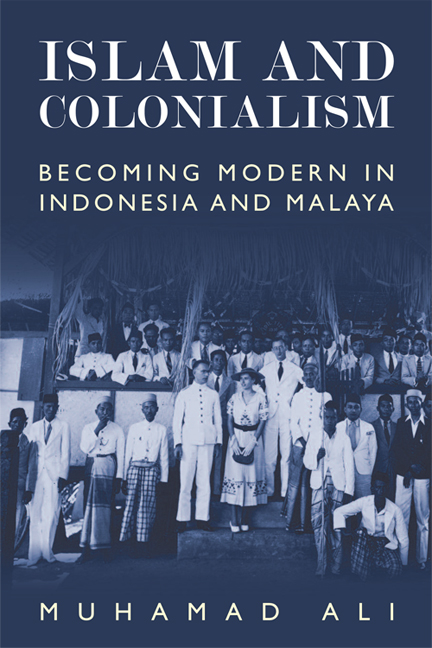Book contents
- Frontmatter
- Contents
- Glossary
- Acknowledgements
- List of Abbreviations
- Transcriptions and Orthography
- Map
- Introduction
- Part I Making Islam Modern
- Part II Modernising Politics and Government
- Part III Modernising Law
- V Integrating Shari'ah, Adat and European Laws
- VI Formalising Legal Plurality
- Part IV Modernising Education
- Conclusion
- Bibliography
- Index
V - Integrating Shari'ah, Adat and European Laws
from Part III - Modernising Law
Published online by Cambridge University Press: 05 September 2016
- Frontmatter
- Contents
- Glossary
- Acknowledgements
- List of Abbreviations
- Transcriptions and Orthography
- Map
- Introduction
- Part I Making Islam Modern
- Part II Modernising Politics and Government
- Part III Modernising Law
- V Integrating Shari'ah, Adat and European Laws
- VI Formalising Legal Plurality
- Part IV Modernising Education
- Conclusion
- Bibliography
- Index
Summary
You know better about your worldly affairs.
(Hadith cited in a Muhammadiyah putusan)Borrowing good things from a kafir would not be considered prohibited [haram] when there were no bad intentions and no negative impact on the person's faith.
(Nahdlatul ‘Ulama fatwa, 1939)Allah will not change the blessing and the fate of a people until they themselves change their laws and regulations in accordance with the development of life.
(Q. 13:11; Al-Hadi 1931: 60–2)In an article entitled ‘The Concept of Progress and Islamic Law’, Professor Noel J. Coulson noted that in classical Islamic theory, law precedes and is not preceded by society: ‘If in Western systems the law is moulded by society, in Islam exactly the converse is true’ (Coulson 1985: 203–4). This is only partially true because despite the belief in the universality of shari'ah for Muslims, its interpretations in the forms of fatwas, law, jurisprudence and rules were not necessarily immutable, being shaped by local and even Western colonial circumstances. In Indonesia and Malaya, Muslim reformers increasingly sought to spread legal interpretations by addressing and accommodating customary and colonial laws. In this chapter, I examine the way in which Muslim reformers and religious authorities began to formulate shari'ah not only in terms of fiqh and legal opinions (fatwa) but also promulgated and at times enacted it in relation to local custom (adat) and by accommodating Western colonial law. They made eclectic articulations of law using terms such as shari'ah, hukum, jurisprudence, wet and recht drawn from the internal context of fiqh traditions and from Western law and local adat.
The institutional role of Islamic law became subsumed within the complex civil and customary legal system in the East Indies, which had unintended consequences, including the creation of an Indonesian school of legal thought (madhhab) or an Indonesian Islam in postcolonial Indonesia (Hooker 2003; Feener 2007). Under colonial circumstances, Muslim reformers in the East Indies tended to frame shari'ah in terms of faith, ritual and morality, rather than making it part of the European civil or common laws. Beyond the colonial co-optation of the traditional qadi and penghulu in charge of Muslim familial matters, there was no reformist idea or movement promoting Islamic law as part of the constitution of the (colonial) state.
- Type
- Chapter
- Information
- Islam and ColonialismBecoming Modern in Indonesia and Malaya, pp. 165 - 192Publisher: Edinburgh University PressPrint publication year: 2015

